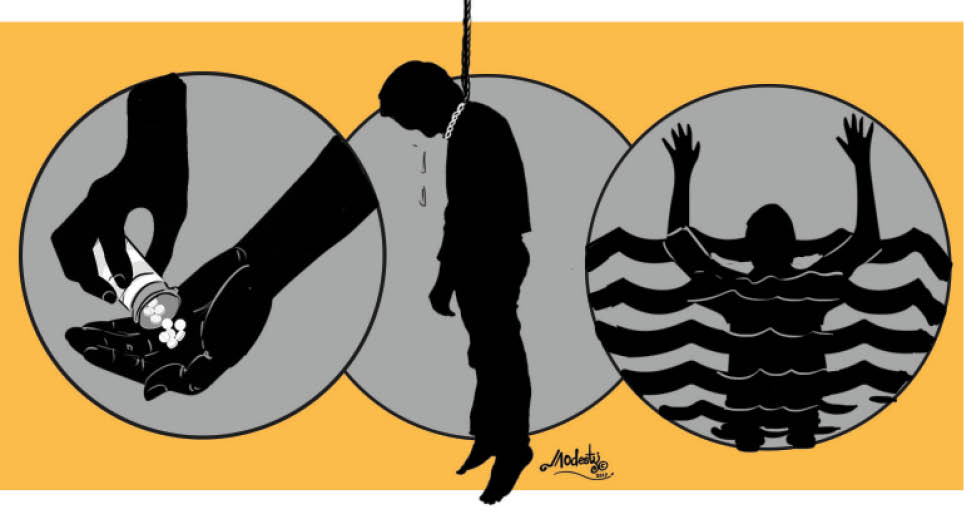World Suicide Prevention Day is observed on September 10 every year to promote worldwide action to prevent suicides. This year’s theme is “Creating hope through action,” reflecting on the need for collective action to address the growing public health crisis that suicide presents.
According to the World Health Organisation (WHO), suicide is among the top twenty leading causes of death worldwide. Every year, more deaths occur due to suicide than to malaria, breast cancer, war or homicide. In 2019, more than 700,000 people died by suicide and in 2020, there was a surge in COVID-19 related suicides due to job losses, lost income and a general sense of hopelessness as the lockdown and social isolation, as a result of the pandemic, separated people from their normal psychosocial support systems.
Experts believe that suicide is underreported in Nigeria, but WHO data reports that at 11.2 per 100,000, the suicide rate is higher in Africa than in other regions of the world. Despite this dearth of data, it is clear that suicide attempts and suicide related deaths happen in Nigeria and the COVID-19 pandemic exacerbated the pressures that people felt.
Reasons behind suicide attempts
In June 2021, popular Nigerian comedienne, Anita Asuoha, aka Real Warri Pikin, revealed that she attempted suicide in June 2018. In debt and with nowhere to turn to, she listened to the voice in her head telling her to “end it” and to “give up already”. On her Instagram page she wrote, “…and because I was exhausted, I believed the voices in my head. I made an attempt to take my own Life”. Today, she is urging people to, “Say no to suicide” and to “Always check on your mental health”.
Some suicides are related to mental health issues while some happen in moments of crisis with some people experiencing a breakdown in the ability to deal with life stresses, like financial problems, relationship break-up or chronic pain and illness. Experiencing conflict, disaster, violence, abuse, or loss and a sense of isolation are also strongly associated with the reasons people may feel a sense of helplessness.
Suicide can be preventable, however in a society where people may feel they have no one to turn to, the social care support systems are lacking or there are no safe spaces for people to talk about how they are feeling, addressing the issue and reaching people is made harder. Ultimately people struggling want to be treated with empathy.
In writing this article, I carried out an informal poll on the people in my circle asking two questions, “do you know anybody who has committed suicide, and have you ever thought of committing suicide”? More than 60% answered “yes” to both questions. If I had gone on to ask if they had sought help for their thoughts, I don’t think I’d have gotten many people saying ‘yes’.
Focus on the Youth
The overall goal of World Suicide Prevention Day is to raise awareness about suicide prevention worldwide. Its objective is to promote stakeholder collaboration and self-empowerment to address self-harm and suicide through preventive action. Stakeholder means ‘all of us’ – family, friends, co-workers, community members, educators, religious leaders, healthcare professionals, political officials and governments – we all must do our utmost to prevent suicide in our communities.
Suicide is the fourth leading cause of death in young people, ages 15-29. This is a cause for concern particularly in Nigeria where young people make up about 60% of the population. In an insightful conversation titled “Mental Health Issues: A Ticking Time Bomb – Youth Edition,” Sola Adesoye, a Behaviour Modification Consultant and Pastor, spoke to three young professionals about mental health and young people in Nigeria.
Responding to the question “Are young people vocalising their issues the way they ought to?” Eghosa Gold-Idehen, a Human Resource professional, said, “Young people in Nigeria are dealing with a lot and just don’t know how to cope with it properly. They are talking, unfortunately, most of the conversations happen on twitter, Instagram and other online platforms”. His recommendation was that these kinds of conversations are best had at home or with professionals who can offer the necessary help.
On knowing what signs to look out for, Christine Bestman, a psychologist, said, “There are different signs for different people. Knowing what is normal for your friends and family in terms of attitude and personality is key, so that you’ll be quick to recognise when there is a shift or a slight change.”
After you identify the danger signs, what can you do? Recognise that you may not be the best person to help them so, encourage them to seek help. Help is more accessible today as innovations in healthcare have made it possible for people to conduct assessments and therapy sessions through online platforms. It is also important to show empathy; be mindful of how you speak about mental health issues to people around you. Finally, stop the stigma around mental health issues. In Bestman’s words, “If you can get a cold and go to a pharmacist or hospital, then you should be able to seek help for a mental health issue”.
If you are in need of mental health support, please contact Mentally Aware Nigeria Initiative on 08091116264 or 08111680686
Beti Baiye is a Programme Manager at Nigeria Health Watch

 Join Daily Trust WhatsApp Community For Quick Access To News and Happenings Around You.
Join Daily Trust WhatsApp Community For Quick Access To News and Happenings Around You.


